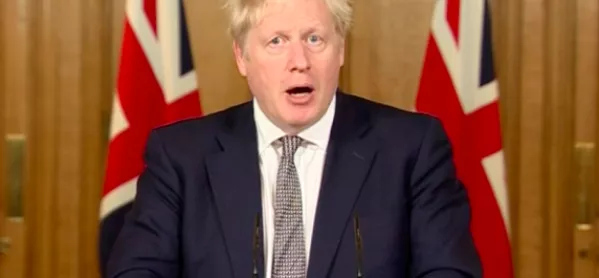PM: We hope to reopen schools from 8 March

The government hopes schools can start reopening to more pupils from 8 March, the prime minister has said.
Setting out broad plans for the easing of lockdown restrictions, Boris Johnson said it would not be possible for schools to fully reopen immediately after half-term.
“The most important principle of all is that reopening schools must be a national priority,” he told the House of Commons today.
But there was not enough data to know for certain that it would be safe for more pupils to return in February, he said.
“The picture should be much clearer by mid-February. By then we will know much more about the effect of vaccines in preventing hospitalisation and deaths, using data from the UK but also other nations like Israel, and we will know how successful the restrictions have been in driving down infections,” the prime minister said.
“We will also know how many people are in hospital with Covid, which we can’t predict with certainty today. So we will then be in a better position to chart a course out of lockdown without risking a further surge that would overwhelm the NHS.”
Covid: Primaries ‘safe’ to open soon, say health experts
Reports: School reopenings ‘will not be after half-term’
Williamson: Teachers to get two weeks’ notice of school reopenings
The “first sign of normality beginning to return”, Mr Johnson said, “should be pupils going back to their classrooms”.
He added: “I know how parents and teachers need as much certainty as possible, including two weeks’ notice of the return of face-to-face teaching.
Boris Johnson: ‘Not possible’ to reopen schools straight after half-term
“So I must inform the House that for the reasons I have outlined it will not be possible to reopen schools immediately after the February half-term. But I know how frustrating that will be for pupils and teachers who want nothing more than to get back to the classroom.”
He said it was hoped that 8 March would be the date when it would be safe to reopen schools, when the most vulnerable groups should have developed immunity from the virus.
He added: “If we achieve our target of vaccinating everyone in the foremost vulnerable groups with their first dose by 15 February, and every passing day sees more progress towards that goal, then those groups [will] have developed immunity from the virus about three weeks later.
“That is...we hope it will therefore be safe to begin the reopening of schools from Monday 8 March, with other economic and social restrictions being removed thereafter, as and when the data permits.”
Yesterday public health experts said there was a “strong case” for primary schools to reopen after half-term if Covid-19 case numbers keep falling.
Education secretary Gavin Williamson said last week there would be a “clear two weeks’” notice of any decision on school reopenings, and that he hoped schools could reopen fully before Easter.
And the prime minister had previously said that the reopening of schools to all pupils after the February half-term break depended on several factors, including the success of the vaccination programme and that the lockdown measures are effective.
Mr Johnson has repeatedly said the schools are a priority when it comes to easing lockdown measures, writing that “keeping our schools closed a moment longer than absolutely necessary is socially intolerable, economically unsustainable and morally indefensible”.
Register with Tes and you can read two free articles every month plus you'll have access to our range of award-winning newsletters.
Keep reading with our special offer!
You’ve reached your limit of free articles this month.
- Unlimited access to all Tes magazine content
- Save your favourite articles and gift them to your colleagues
- Exclusive subscriber-only stories
- Over 200,000 archived articles
- Unlimited access to all Tes magazine content
- Save your favourite articles and gift them to your colleagues
- Exclusive subscriber-only stories
- Over 200,000 archived articles



